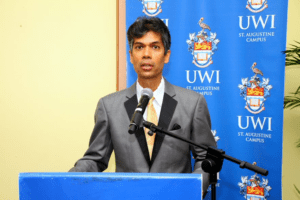
SUGAR workers in T&T once displayed sacrifice, persistence, hard work and loyalty.
Today, this work ethic and these values are scarce and have been steadily declining in the Caribbean.
Today, houses are built on prime agricultural lands and the plight of the few farmers remains unresolved.
Today, famers continue to suffer as their crops are destroyed by flood waters. Today, the struggling, peasant farmer continues to be the backbone of market gardening, cultivating fresh fruits and vegetables, and tending poultry, sheep and goats.
Undoubtedly, the closure of Caroni (1975) Limited was a serious blow to thousands of workers in the sugar cane industry who were breadwinners for their families. Those workers who were employed in the sugar industry have made a valuable, significant and visible contribution to Trinidad and Tobago and the Caribbean.
How are these unsung heroes treated in Trinidad and Tobago? Some of these ex-workers have died and others are below the poverty line because their savings are depleted. Some lost their investments as a result of the unfortunate collapse of two financial institutions- CLICO and Hindu Credit Union.
Additionally, there have been reports of ex-workers wasting their money on vices as gambling and prostitution. Some are unable to cope with unemployment and suffer from mental depression whilst others are unable to deal with health challenges including diabetes and hypertension. This has affected families and resulted in divorces, separations and domestic violence.
In the 21st Century, the Indo-Caribbean has tended to overlook the importance of agriculture. They have contributed to independent, rational, logical and progressive thinking which has led to peaceful co-existence and harmony in our country.
The decision of the University of the West Indies to build a south campus and the expansion of tertiary education in central Trinidad would allow opportunities for ex-sugar workers to gain new skills and discover new talents. These former workers need to also be willing to embrace this education being offered.
Unemployed men and women, who once worked on the sugar plantations, are no longer liberated. They now depend on assistance and health care from the government. Also, many of these retrenched workers are unable to send their children to primary and secondary schools.

The government should consider providing scholarships to the children of ex-workers who are willing to be educated. Multinational corporations and prosperous local companies should make efforts to assist these former sugar workers who are marginalized. Private businesses should also consider funding programs to improve the welfare of this forgotten part of population. Any money that is invested into these ex-sugar workers and their children would serve a much greater benefit than money donated to pathetic political parties.
Agriculture is the lifeblood of developed nations. Thus, present and future governments of Trinidad and Tobago should consider reviving the sugar cane industry. This revival could possibly be achieved on a smaller scale but will need foreign and local investment to be successful. Other Caribbean countries need to also consider protecting or reviving their sugar industry.
Some of us have not fully understood the repercussions of the closure of the sugar industry in Trinidad and Tobago. Future generations will never be able to witness tall cane stalks swaying in the wind, the annual cane fires, reaping and weighing of canes or transport to the factories. These would only be memories confined to photographs and museums. The younger generation must know T&T’s agricultural past and why our food import bill is so high.
Dr Jerome Teelucksingh is an activist. He initiated the inaugural observances of International Day for the Elimination of Violence Against Men and Boys (January 31) and World Day of the Boy Child (May 16). He has made academic presentations at tertiary institutions including Harvard University and Oxford University.
See other articles by Dr Jerome Teelucksingh on AZP News:
Are Humble Caring Fathers Champions?
Influencing West Indian Masculinity
Defining Caribbean Masculinity
Is Monogamy Encouraged in the Caribbean
Naps Girls: From Humble Beginnings to Excellence
US Media Creates Cultural Dependency in the Caribbean
Bloodless Revolution to Save Lives in Developing Countries
The Need for a Social and Moral Revolution
The Law of Supply and Demand in Developing Countries
End the Dependency for Developing Countries
T&T Carnival and the Emperor’s New Clothes
The Influence of Labour on Caribbean Integration
The illusion of political Unity
Presbyterians in Trinidad: Humble Missionaries, Local Workers
Religious Plurality: Curse or Blessing
Caribbean Youth Need Optimism, Patriotism
Rethinking Identities in Caribbean, Latin America
November 19: All Inclusive International Men’s Day
Should International Agencies be Blamed for Unemployment
A Need to Observe Word Unemployment Day
An Ideology for the Trade Union Movement
The Man who Couldn’t be Prime Minister
Social Outburst vs Social Revolution
Challenges of the Men’s Movement
If George Floyd was Denied Parole
The Meaning of Indian Arrival Day in T&T
International Men’s Day – A Way of Life
Wounds that cause school violence
May Day: A Time for Solidarity, Strength
Who Coined the Term ‘Black Power’
The illusion of political Unity
Presbyterians in Trinidad: Humble Missionaries, Local Workers
Religious Plurality: Curse or Blessing
Caribbean Youth Need Optimism, Patriotism
Rethinking Identities in Caribbean, Latin America
November 19: All Inclusive International Men’s Day
Should International Agencies be Blamed for Unemployment
A Need to Observe Word Unemployment Day
An Ideology for the Trade Union Movement
The Man who Couldn’t be Prime Minister
Social Outburst vs Social Revolution
Challenges of the Men’s Movement
If George Floyd was Denied Parole
The Meaning of Indian Arrival Day in T&T
International Men’s Day – A Way of Life
Wounds that cause school violence
May Day: A Time for Solidarity, Strength
Who Coined the Term ‘Black Power’
![]()











